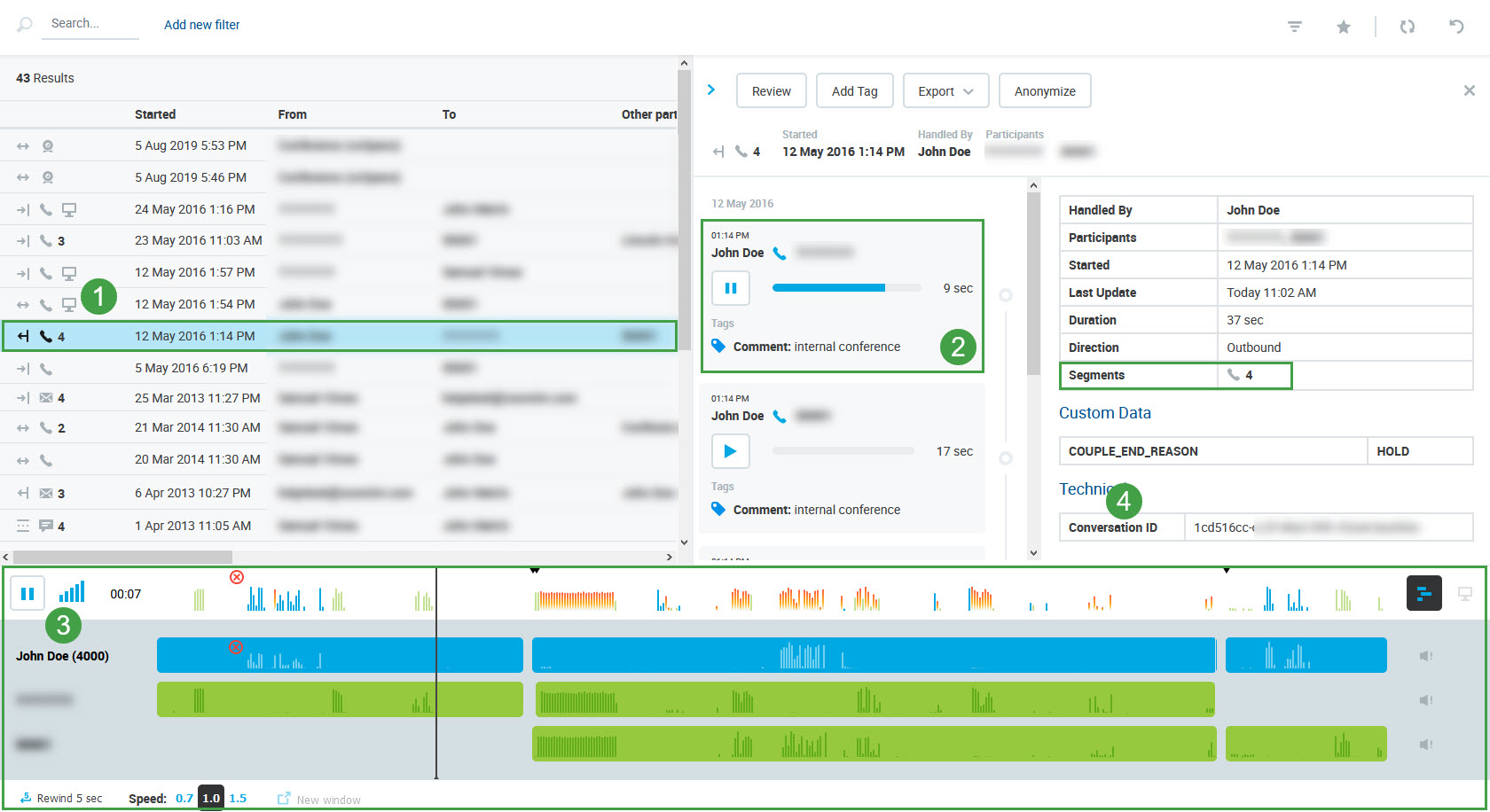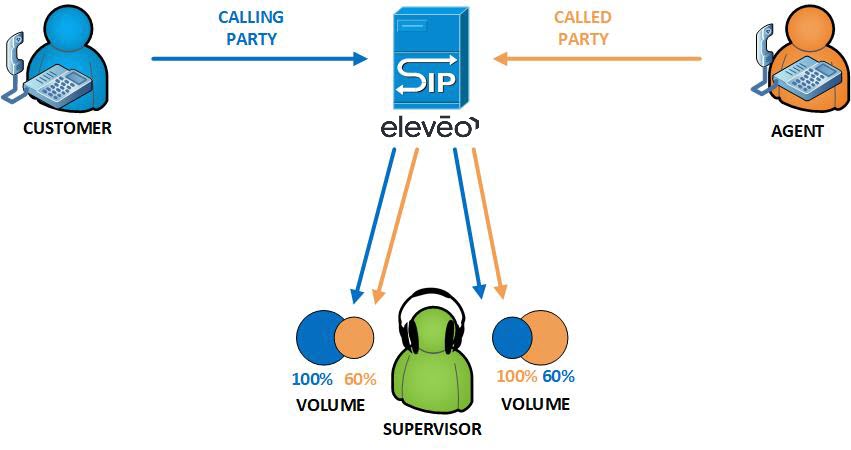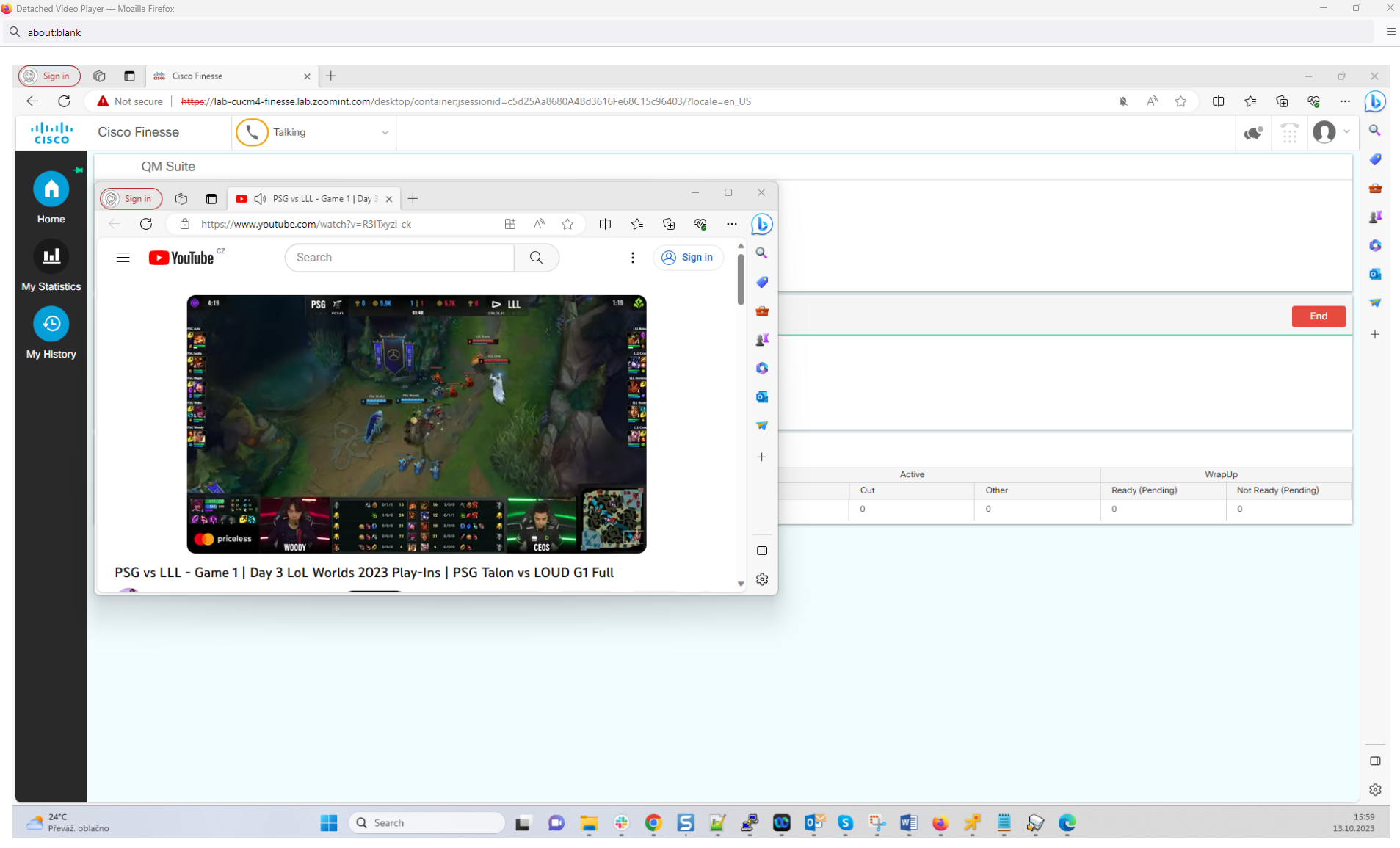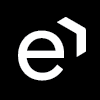Interaction Player
The Interaction Player is a media player which allows playback of media listed on the Conversation Explorer. Quality Management offers a revamped and enhanced interaction player, providing extended support for the playback of multiple media formats within an intuitive user interface. All participants are visible as separate, color coded waveforms within the player. Having all participants visible permits users the opportunity to clearly see and understand what occurred during the conversation.
|
Supported Media |
MP3, WAV, RECD, MP4*(only MP4 files from the CMS integration are supported) |
|---|---|
|
Unsupported Media |
Multiple screen recordings of multiple users, cube phone video recordings (MP4), mixed RECD+MP3 (mixed MP4) |
*CMS Video recordings are not visible unless the user has the required permission INTERACTIONS_FULL_VIEW.This permission is assigned to the CCManager role by default.
The Player and Its Functionality (Basic Usage)
Select a conversation from the conversation list. The details of the call will display in the panel to the right side and the player's interface will appear at the bottom of the screen. The waveform will load along the timeline. The number of segments is listed in the Details pane and it is reflected on the timeline within the player's interface.
Click the Play button to begin playback of all related media. Click on the waveform button to view or hide the individual segments. It is also possible to play each segment directly from within the Preview window.
Media Playback
There are multiple ways to start playback of a recording:
-
Double-click on the item from the list of conversations to play the associated recording. (Click once to highlight a conversation, click twice to begin playback)
-
Click once to highlight a conversation, then Click on the play button of the particular call segment from within the Preview panel on the right hand side. The playhead will indicate the progress of the playback on the timeline within the Interaction Player interface. Progress will also be displayed on the bar in the Preview pane. Only the selected segment will be played back. If playback is in progress and you click the play button for a different segment, the new segment will play from the beginning. To play all segments, use the controls for the interaction player at the bottom of the screen.

-
Click on the Play button within the Interaction Player interface at the bottom of the screen to begin playback from the beginning of the recording. Click on the timeline to move the playhead and start the playback from the different point in time.
-
Additional details are visible in the right-hand pane.

The Player plays the conversation. If a record related to the selected conversation contains any Speech tags they will be displayed in the Player along with the color coded waveform. Each individual waveform is color coded: green for customers, blue for agents The various colors in the waveform distinguish the called and calling parties as follows:
-
Light green – Called customer
-
Dark green – Calling customer
-
Light blue – Called agent
-
Dark blue – Calling agent
-
Orange – Customer on hold
-
Gradient red – Crosstalk
If the calling/called party can not be recognized, it is displayed with a green waveform (default color).
It is important to note that the waveform of the person initiating the call is always darker. If available, the timeline will be marked during the agents wrap-up time.
The Interaction Player and Its Functionality
The various parties in the conversation are displayed below the primary waveform separately. Click on the waveform button to view or hide the individual segments. Each individual waveform is color coded: green for customers, blue for agents (if the ID or DN for the specific agent is available to be paired with the conversation or segment).

-
Click the the Play or Pause button to control the conversation playback.
-
Hover over the volume and click to adjust the audio volume or to mute the sound.
-
If media files are present, the following options may be visible:
-
Screen Recording – If the conversation you are playing contains a screen recording (record will be marked with the Screen button). Click on the button to open the playback window. If no screen recording is available the button is greyed out.

During playback the button will be highlighted . Screen recordings are not loaded until you expand the playback window. Audio can be played back at any time. -
Video Recording – If the conversation you are playing contains a video recording (record will be marked with the Video recording button). Click on the button to open the playback window. If no video recording is available the button is greyed out .

-
-
The scroll bar (on the right hand side) is only visible in the case that there are more than four media streams.
Note: When video is attached to recordings, the conversation will play from the beginning to the end without the ability to skip throughout the recording(seeking is not supported for video and conference video recordings). This is due to the way encryption and decryption work on the server side in this version.
Call Volume
The player outputs audio in a way that enhances the listening experience. The audio streams are played back in stereo so that both parties can be heard. To enhance the listening experience the audio for Calling parties is played at 100% Volume in the left ear, while the called party is played back at 60%. On the opposite ear the Called party is played at 100% while the Calling party is played back at 60%. It is still possible to use only one earphone to listen to both parties.

Call on Hold
Whenever possible calls on hold will be indicated within the player. In this example the agent activity remains visible while the customer is on Hold (marked in Orange).

Speech Tags
Tags are displayed in their relevant location. Hover the mouse over a tag to view the tag name.

Additional Media Available
The waveform will indicate if there is additional media available with a particular audio recording. If Screen recordings are available they are indicated on the screen by a darker band below the audio waveform. The screen indicator bar may not correspond to the audio length! The potential options are displayed in the image below. What is actually displayed on your screen will correspond to the actual content available for playback.

Saved Preferences
Volume and some player preferences are saved and will be applied to the next conversation opened. If you mute a recording the next recording you open will also be muted!
The Player and Its Functionality (Advanced Usage)
Play Single Stream / Mute a Channel
To playback only one selected audio stream click on the audio button (greyed out), it will change to a blue speaker button to indicate that it has been selected. The selected audio will be playable, all others will be muted 
Tip
If there are more than four (4) audio segments it is possible to scroll up and down to view them all.
Time
Hover over the timestamp to view the length of the entire recorded conversation and the date and time at which is was recorded.

-
The current position of the playhead is shown in relation to the total length of the conversation. In the example here we see that we are six seconds into a recording which is twenty one seconds long – 00:06 / 00.21)
The date and time of the original conversation is displayed directly alongside the conversation length. In this example we see that the conversation occurred on the twelfth of May, 2016. The time indicated is the time when the actual recording occurred. -
The playhead indicates where the playback is at a given time. Click to move the playhead to a new location.
Gaps in recording
Any gap in the recording is indicated by a small triangle along the timeline and empty space between the various waveforms. Hover over the small triangle to view the length of the gap. The gap is calculated as the difference in time between the end of the previous segment and the start of the next one, this includes recorded screens.
For example:
-
Without screen recordings: Audio Segment 1 ends at 10:01:03 and Audio Segment 2 starts at 10:03:03, the gap equals 2:00 minutes.
-
With Screen Capture recordings: Audio Segment 1 ends at 10:01:03, Screen Segment attached to the first audio segment ends at 10:02:03 and segment 2 starts at 10:03:03, the gap equals 1:00 minute.
If there is no significant break between the segments, and no silence, the system will indicate No Gap between segments, or zero (in case the gap is less than one second and greater than 0).
Playback Options
Additional playback options may be available at the bottom of the Player during playback of longer conversations.

-
Rewind 5 sec: Click to skip back five seconds in time during playback.
-
Speed: Adjust the speed of playback to 0.7, or to 1.5 times the normal speed. Note, voices may be distorted as a result.
-
Scale: Adjust the amount of playback time visible. For longer conversations this focuses on a specific portion of the recording.
-
Follow playhead: When using the Scale option to view a part of a conversation the playhead may be lost. Click to jump to the playhead location.
-
New window: Click to open the current screen recording in a new window if available.
Media Cache
For very long video/screen recordings it may be necessary to wait several minutes for the recording to be loaded and for playback to begin. The first time the media is requested it is loaded to the cache on the server before being made available for playback. Subsequent playback requests load much faster.
Audio is prioritized and will start playing as soon as it is available, the waveform will display as soon as it is rendered.
Playback Screen Recordings
To view available screen recordings click the Show screen capture button, the recording of the monitor(s) will display below the wave form. Clicking the button again will collapse the viewing area.
The Player area expands displaying the recording. Some parts of the conversation may have a screen recording attached, others not. If no screen recording is available you will be notified about the absence of a screen recording within the given conversation segment by a message displayed within the playback area. Until the Show screen capture button is clicked the system will only load the audio portion of the recording.
The elapsed time indicates at what time in the conversation the playhead is located. At any time you may click the playhead at the point in the timeline where you want to start playback.

-
Click on the Screen button to open the player.
-
The playhead indicates elapsed time (If the waveform is visible it indicates who is speaking)
-
The entire recorded agents screen is viewable to the left hand side. The focused window on the right side displays an enlarged version of the agents screen where the agents mouse cursor was at that time in playback. Hover over the recorded screen to focus on a different area.
-
Click on the New window button to open and playback the recording in a new (full size) window. This allows the screen recording to be played back in higher resolution.

During the playback of screen recordings, the rendering of the screen recording may be delayed (by up to 3 seconds, from time to time) if the local workstation does not have sufficient CPU resources available.
Multiple Monitors and Playback
It is possible to view the recordings of multiple monitors within one segment, if an agent is using multiple monitors at their workstation.
In the case that the recording contains multiple recorded monitors the image is enlarged more than usually. In the example below two recorded monitors are visible on the left side, while the focused area is displayed on the right side.
-
The area which is focused is marked by a blue box.
-
The focused view on the right highlights the agent's mouse cursor.

Space Saving Tip
Click on the Waveform button to collapse the visible wave forms and provide easier viewing of other content on the screen.
Click on Screen button to stop viewing the recording.
If there are multiple screen recordings (RECD files) in a conversation between two agents only one is playable. All files are exportable from within the Call Recording WebUI.
When there are more than four participants to a conversation the player may not display the recordings properly.
If the browser is not able to render the video (for any reason) the play button will change to a spinning button 
Playback Screen Recordings in a New Window
To enlarge the recorded screen view click the New window button. The Player opens in a new window that you can resize as needed and then close as necessary. The Playback controls remain on the Conversation Explorer, they are not available on the newly opened window! To return to the Conversation Explorer close the the external window, or use the ESC key.
Playback tips
The agent's mouse is visible on the recorded screen and will be highlighted (enlarged) by default. Hover your mouse cursor over an area of the screen recording to view that area of the recorded agents desktop. When you move your mouse away the window will again focus on the recorded agent's cursor.
Playback starts from the time where you place the playhead.
Playback Video Recordings
To view available video recordings click the Show video button, the recording will display below the wave form placeholder. Clicking the button again will collapse the viewing area.
The Player area expands displaying the video recording. Some parts of the conversation may have a recording attached, others not. If no recording is available you will be notified about the absence of a recording within the given conversation segment by a message displayed within the playback area.
The elapsed time indicates at what time in the conversation the playhead is located. At any time you may click the playhead at the point in the timeline where you want to start playback.

-
Click on the Video button to open the player.
-
The playhead indicates elapsed time (The waveform is not available for video recordings!)
-
The video recording is displayed.
Hover the mouse pointer over the video to view the player control options.
-
Click on the New window button or the expand to full-screen button to open and playback the recording in a new (full size) window. This allows the recording to be played back in higher resolution. Use the ESC key or click on the exit full-screen button, to exit full screen mode.
-
Click on the close Video button to close the player.
Video specific limitations
-
CMS Video Recordings – The name of the conference is displayed in the FROM column of the Conversation Explorer, all other metadata is visible within the detail pane.
-
Waveform – There is no waveform available for Video recordings.
-
Reviews – Reviews are not currently supported for video recordings.
-
Roles and permissions – Only users with the role Conversations - Full view assigned are able to playback Video recordings! Read more about Quality Management Roles.
-
Segment view – The display of segments is not supported for video recordings.
-
Multi segment videos – full-screen mode only supports playback of one segment at a time. If you wish to view a video with multiple segments in full-screen mode it is necessary to manually skip to the segment you wish to view in full-screen and then trigger full-screen mode.
-
Playback in full-screen – It is not possible to pause playback while in full-screen mode, and some browsers do not support seeking while in full-screen mode.
Troubleshooting tip
In case the Player does not play conversations, please check that the following default options are enabled in your Internet Browser:
-
Enable automatic image resizing
-
Play animations in webpages
-
Play sounds in webpages
Please note that some calls are more suited for playback with the Call Recording player (available from the Call Recording WebUI).
-
Calls and screens between two agents and (two RECD files) – playback of multiple files is not supported if they are in separate segments. Only one RECD file will be playable.
|
Error/Warning message |
Description |
|---|---|
|
Interaction Player not visible on the screen |
The Interaction Player may not be displayed if you have browser adblockers or tracking protection activated. Disable all adblockers / privacy protection add-ons and restart the browser. |
|
No sound during playback |
Waveform loads and player plays as expected but there is no sound. Check that the player is not muted. Click on the sound bar button. |
|
Media file cannot be played |
Conversation loading issue. This might be caused by a back-end server application being unable to fetch the media in a timely manner from the source. Please contact your system administrator if this error continues to appear. |
|
Media file cannot be played (screen recordings fail to playback) |
Some recorded media may be corrupted (remote connection terminated unexpectedly, file or recording may be corrupted on server). Playback of media may not be possible via the Interaction Player. |
|
Missing Media |
Media not available for playback or decryption error. |
|
Video Error |
For RECD, missing file or inaccessible storage. |
|
Video doesn't load, spinner spins |
Media loading, please wait. |
|
No video available for the current playback time |
File not yet loaded. Click play on Play to load and display content. or Video file not playable or unavailable. |
|
Load Waveform Failed |
Waveform can not be rendered due to a missing or erroneous audio file. Audio may still be played.
The No Stream Recorded warning message will display alongside the conversation to indicate this error.
|
|
Segment media error |
Audio file loading issue. |
|
Some parts of the mix are not available |
There is a segment missing from the conversation. |
|
Failed to Load Conversation |
Can not load the conversation or server error. |
|
Failed to Load Waveform |
Can not load the file or unable to generate the waveform. |
|
No audio |
Audio file missing or not playable. |
|
Failed to parse message |
Browser error. Disable add-ons and reload the page. |
|
Screen recordings fail to playback or freeze |
Playback of HD recordings is resource demanding on client workstations. We highly recommend that playback occurs on workstations with sufficient CPU and RAM (check on the Workstation Requirements page). To improve the fluidity of playback it is possible to adjust the following: FPS (frames per second), scale (resolution) and quality of recorded screens. FPS has a direct impact on CPU usage, Scale has a direct impact on memory consumption. |
|
Identical / Duplicated waveform displayed |
This is expected behavior for Integrations that generate only mono audio recordings, such as MS Teams Recording©. Two identical audio waveforms are displayed for mono recordings, one for each channel. |
Note: The player is NOT backward compatible with lower versions!
"MS Teams © Recording is a registered U.S. trademark of Microsoft."
Corrupt files
If for any reason there is a corrupt file played back, the player will display an error and skip the corrupt segment (or file). The player will display a blank screen to indicate the media is not playable.



